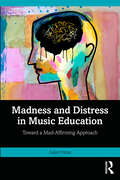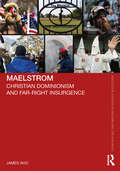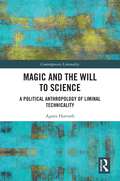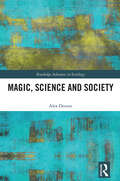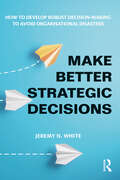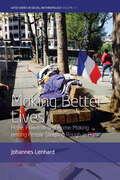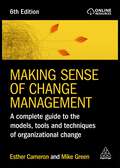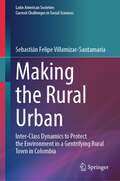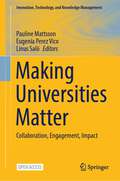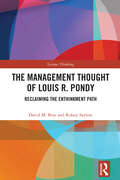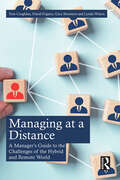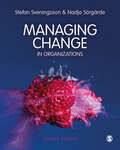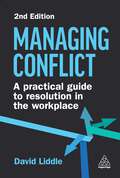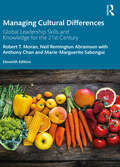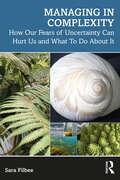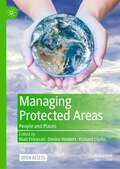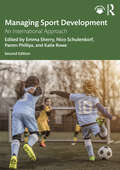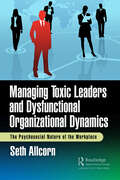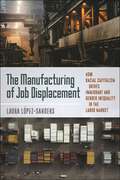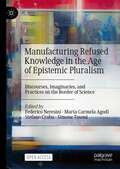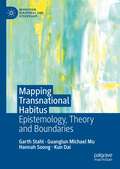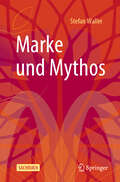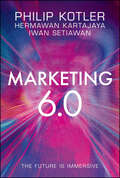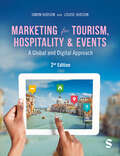- Table View
- List View
Madness and Distress in Music Education: Toward a Mad-Affirming Approach
by Juliet HessMadness and Distress in Music Education offers an in-depth exploration of mental health and emotional distress in the context of music education, offering new ways of thinking about these experiences and constructing ways to support distress through affirming pedagogy, practices, and policies in music education. Centering the lived experiences of 15 people in a range of roles across music education who self-identify an issue with their mental health, the volume addresses impacts on both students and educators. The author draws on Mad Studies and disability studies to present new paradigms for thinking about Madness and distress in the music context. An essential resource for music educators, music education researchers, and preservice students seeking to understand the complexities of mental health in the music classroom, this book considers how people conceptualize their mental health, how distress impacts participation in music education, how music education may support or exacerbate distress, and what supports for distress can be implemented in music education.
Maelstrom: Christian Dominionism and Far-Right Insurgence (Routledge Studies in Fascism and the Far Right)
by James AhoMaelstrom: Christian Dominionism and Far-Right Insurgence illuminates the latest outbreak of right-wing extremism in America. This book reviews the cyclical nature of right-wing resurgences in American history, dismisses the appropriateness of the word “fascism” to explain them, and then describes in depth the goal of “reconstructing” American institutions on the basis of biblical principles. It critiques the popular view that far-right politics is carried by stupid, socially isolated, nuts. To this end, it discusses the logicality of the “big lie” and examines in detail how people are recruited into the far-right, by entertaining the theories of authoritarianism and resource mobilization. Finally, it characterizes how the ends-oriented rationality of far-right activists differs from the mini-max criterion of rationality utilized by the ordinary person. This can motivate them to be violent and can frustrate efforts by the government to control them.
Magic and the Will to Science: A Political Anthropology of Liminal Technicality (Contemporary Liminality)
by Agnes HorvathThis book offers a political anthropological perspective on the problematic character of science, combining insights from historical sociology, political theory, and cultural anthropology. Its central idea, departing from the works of Frances Yates and the Gnosticism thesis of Eric Voegelin, is that far from being the radical opposite of magic, modern science effectively grew out of magic, and its varieties, like alchemy, Hermetic philosophy, the occult, Gnosticism, and Neoplatonism. Showing that the desire to use science to solve various – real or presumed – problems of human existence has created a permanent liminal crisis, it contends that the ‘will to science’ is parasitic, existing as it does in sheer relationality, outside of and in between concrete places and communities. A study of the mutual relationship between magic and science in different historical eras, ranging from the Early Neolithic to recent disease prevention ideas, Magic and the Will to Science will appeal to scholars and students of social and anthropological theory, and the philosophy and sociology of science.
Magic, Science and Society (Routledge Advances in Sociology)
by Alex DennisMagic, Science and Society investigates the way the ‘rationality debate’ has developed over the last century, from E.E. Evans-Pritchard’s study of Azande magic, through Peter Winch’s argument that there can be no such thing as a social science, across the arguments about the proper status of science in the 1970s and 1980s, to the ‘epistemological’ and ‘ontological’ turns of the early twenty-first century.Different people have different understandings of what is rational: some practise magic, some orientate to legal convention and tradition and others defer to science and logic. Starting with anthropological studies of witchcraft, and working through to contemporary debates about epistemology and ontology in social science, this book systematically examines the ways key questions about these issues have been framed and answered. These include: Can ‘magic’ be real, either for members of the cultures that practise it or more generally? How can we arbitrate between different types of rationality? Is science a benchmark for studying other forms of rationality or just a cultural practice like any other? What are the implications of these issues for the social sciences themselves? This book will be of interest to anthropologists, sociologists, philosophers of the social sciences and science studies practitioners.
Make Better Strategic Decisions: How to Develop Robust Decision-making to Avoid Organisational Disasters
by Jeremy N. WhiteEvery day we hear of serious errors of judgement that result in organisational disaster. Why do seemingly successful businesses, NGOs, or even political parties fall prey to irrevocable governance breakdowns or, worse still, criminal malpractice? By prompting readers to think deeply about strategic decision-making, human behaviour, and cognitive biases, this book offers a disciplined, objective, and thoughtful approach to making better decisions. Every strategic problem is fundamentally a journey into the unknown, which involves a unique combination of duration, scale, external and internal dynamics, and personal motivations. Rarely is a strategic decision solved by saying, ‘If a situation is A, then the solution is B.’ The book explores how to develop a strong foundation for problem resolving – rather than simplistic problem-solving – by strengthening competence so that decisions are made wisely. The case of Carillion plc, the second-largest construction group in the United Kingdom that went bankrupt in January 2018, is used to explore how a large and profitable company collapsed so dramatically when it was run by an experienced board and advised by three of the Big Four accounting firms. Professor Jeremy N. White presents a clear strategic toolkit for better strategic decision-making. This book will appeal to senior managers who are interested in techniques for making better strategic decisions. The lessons from the failure of Carillion plc are applicable to corporate leaders in addition to politicians and those who run not-for-profit organisations.
Making Better Lives: Hope, Freedom and Home-Making among People Sleeping Rough in Paris (WYSE Series in Social Anthropology #11)
by Johannes LenhardIn this ethnographic study, Johannes Lenhard observes the daily practices, routines and techniques of people who are sleeping rough on the streets of Paris. The book focusses on their survival practises, their short-term desires and hopes, how they earn money through begging, how they choose the best place to sleep at night and what role drugs and alcohol play in their lives. The book also follows people through different institutional settings, including a homeless day centre, a needle exchange, a centre for people with alcohol problems and a homeless shelter.
Making Sense of Change Management: A Complete Guide to the Models, Tools and Techniques of Organizational Change
by Esther Cameron Mike GreenHow can organizations effectively navigate times of change? This book provides comprehensive guidance on adapting mindsets, structures and strategies to achieve success.Making Sense of Change Management is a classic text for beginners through to seasoned practitioners, which covers the theories and models of change management and connects them to workable techniques that organizations of all types and sizes can use to adapt to tough market and environment conditions. The updated sixth edition includes an introduction to emerging regenerative mindsets, change processes, and ways of doing and being that will help meet both the urgency and the longer term requirements for change in response to unfolding crises. The book also references the impact of climate change, COVID-19, and other interconnected crises, and illustrates how compassionate, sustainable leadership can positively impact the way change is managed in organizations, and therefore the outcomes for all.This definitive, bestselling text in the field shows how to succeed by changing strategies, structures, mindsets, behaviours and expectations of staff and managers. Supported by thoughtful and provocative questions at the end of each chapter, as well as checklists, tips and summaries to apply knowledge in practice, Making Sense of Change Management remains essential reading for both students and practitioners who are currently part of, or leading, a change initiative. Online resources include international case study question packs and lecture slides with further reflective questions.
Making the Rural Urban: Inter-Class Dynamics to Protect the Environment in a Gentrifying Rural Town in Colombia (Latin American Societies)
by Sebastián Felipe Villamizar-SantamaríaThis book takes the small rural town of La Calera, in the outskirts of the Colombian capital of Bogotá, as a case study to analyze how residents from different social classes – wealthier ex-urban newcomers arriving to traditionally peasant and rural areas – interact to decide how nature will be used in the face of further urban expansion. Contrary to the conflicts in other gentrification cases, including those of “green” gentrification, this book shows how newcomers and longtimers in La Calera use environmental concerns to bridge social class rifts and push the state to provide water, public space, and decision-making power. Residents see abundant ecological resources like water and land around them, but they do not have access to aqueducts, green public space or power over planning decisions affecting the distribution of these resources. As a response, and to challenge the state more effectively, newcomers and longtimers create inter-class alliances through what the author calls third nature: the way residents try to both protect and keep using existing ecological goods. To do so, despite high levels of class inequality, residents had a similar goal of protecting ecological resources around them by intervening in the physical and political landscapes against a state that induces scarcity, selectively enforcing environmental policies to the detriment of Calerunos. As cities all around the Global South continue to grow, urban expansion posits a threat to the environment by transforming agricultural and protected areas into denser residential or touristic spaces. Moreover, as natural resources become scarcer in the face of climate change, inequality might further existing environmental privileges and vulnerabilities. By examining closely how Calerunos bridge class inequalities for environmental reasons, this case highlights processes that inform other gentrifying rural spaces around the world.
Making Universities Matter: Collaboration, Engagement, Impact (Innovation, Technology, and Knowledge Management)
by Pauline Mattsson Eugenia Perez Vico Linus SalöIn an era of rapid change and increasing societal demands, the role of universities as knowledge producers and catalysts for change has come under scrutiny. This open access book offers a fresh perspective on the significance of universities in society, shedding light on how their knowledge can truly matter beyond academia. Drawing upon insightful inquiries from both the Swedish and international contexts, this volume delves into the multifaceted interactions between universities and various knowledge users, emphasizing the need for scholars to reflect on how their knowledge can become useful and applicable to wider society. Organized into three compelling themes, collaboration, engagement, and impact, this book explores the concept of "mattering". Together and jointly, they point at the fluid movement of scholars and scholarly knowledge across academic, political, and public spaces, and the intentional actions of scientists to leverage their expertise for real-world impact. Essential reading for social science and humanities scholars, university management professionals, and individuals keen on a critical understanding of the evolving role of universities, this volume offers a comprehensive examination of how universities have mattered, continue to matter, and can shape the future.
The Management Thought of Louis R. Pondy: Reclaiming the Enthinkment Path (Systems Thinking)
by David M. BojeLouis R. Pondy was a leading management and organizational studies scholar whose work on open systems helped launch and define the future of the field. This book offers an assessment of Pondy’s contribution, through critical reflection on what happened to the relationship between conflict theory and “beyond open systems.” Exploring the ways in which Louis R. Pondy theorizes conflict and systems, and how he challenged the status quo paradigms, this book offers a historical analysis on Pondy’s work and the relation to contemporary management theory. The author develops a Triple Loop framework, building on Pondy’s theories as well as the work of Gregory Batesom, to demonstrate a beyond-open-systems approach and existing single- or double-loop systems. Demonstrating the value and legacy of Louis R. Pondy, this book will have international appeal to researchers, academics and students across management disciplines and organizational studies, including systems thinking and conflict resolution.
Managing at a Distance: A Manager’s Guide to the Challenges of the Hybrid and Remote World
by Tom Coughlan David J. Fogarty Gary Bernstein Lynda WilsonThe world of hybrid and remote management is a territory that has yet to be completely explored—this book provides some simple navigational aids to help managers and leaders find their way.Research indicates that over 56% of college graduates currently work either remotely or in a hybrid arrangement, while prior to the pandemic, less than 5% of working hours were remote. How to manage remote and hybrid workers has rapidly become a significant challenge, and one that often requires new policies and organizational restructuring. The remote work handbooks available are tactical, which can be helpful for day-to-day decisions but not to tackle larger issues and initiatives. This book presents a fully formed, research-backed strategic framework: more than a vehicle to the future, it will help leaders to understand where they are now and what is happening around them to change the landscape, and to decide where they want to be.Speaking to senior executives and team leaders, as well as business students, this book will become the preferred tool for the development and evaluation of remote and hybrid management policy and strategy across industries.
Managing Change in Organizations
by Stefan Svenningson Nadja SörgärdeManaging Change in Organizations, second edition, explores a broad range of perspectives on change management, encouraging critical reflection and making sense of a complex field of theories. Its unique approach, based around three key perspectives of change, will help you to understand: · How change is accomplished – the tool perspective · What change means for those involved – the process perspective · Why change is initiated (and whether it is necessary) – the critical perspective Updated throughout to include new examples, case studies and exercises, this essential text offers you the chance to learn pragmatic tools for managing change, as well as gain an in-depth understanding of different theories and their values. Stefan Sveningsson is Professor of Business Administration at the School of Economics and Management, Lund University. Nadja Sörgärde is Senior Lecturer in Business Administration at the School of Economics and Management, Lund University.
Managing Change in Organizations
by Stefan Svenningson Nadja SörgärdeManaging Change in Organizations, second edition, explores a broad range of perspectives on change management, encouraging critical reflection and making sense of a complex field of theories. Its unique approach, based around three key perspectives of change, will help you to understand: · How change is accomplished – the tool perspective · What change means for those involved – the process perspective · Why change is initiated (and whether it is necessary) – the critical perspective Updated throughout to include new examples, case studies and exercises, this essential text offers you the chance to learn pragmatic tools for managing change, as well as gain an in-depth understanding of different theories and their values. Stefan Sveningsson is Professor of Business Administration at the School of Economics and Management, Lund University. Nadja Sörgärde is Senior Lecturer in Business Administration at the School of Economics and Management, Lund University.
Managing Conflict: A Practical Guide to Resolution in the Workplace
by David LiddleWhether it's a disagreement between colleagues, a dispute with management or large-scale industrial action, conflict at work is a perennial problem for organizations, their people and profits.The second edition of Managing Conflict shows HR professionals how to tackle these problems by not only resolving current issues, but also preventing future instances of conflict. It includes the latest research and case studies showing how conflict management has been impacted by hybrid working models and digitalization. There are also updates to reflect how resolution is a driver of trust in organizations, enabling people to disagree more constructively in a safe environment.This book covers the causes and costs of conflict, the impact of the psychological contract and the legal framework for managing workplace disputes both in the UK and internationally. It shows how to design a conflict management strategy, develop a formal resolution process and engage stakeholders and training managers in resolution and mediation skills. Packed with best practice examples from organizations such as Tesco, Burberry and Nationwide Building Society as well as conflict resolution resources and toolkits, this book is essential reading for all HR professionals looking to resolve conflict in the workplace.
Managing Cultural Differences: Global Leadership Skills and Knowledge for the 21st Century
by Robert Moran Neil Abramson Anthony Chan Sabongui Marie-MargueriteIn today’s global business environment, it is vital that individuals and organizations have sophisticated global leadership skills. Communication and understanding of different cultures are paramount to business success. This new edition of the bestselling textbook Managing Cultural Differences guides students and practitioners to an understanding of how to do business internationally, providing practical advice on how competitive advantage can be gained through effective cross-cultural management. The digitization of the workplace, the integration of artificial intelligence into workplace cultures, cultural responses to crisis, and the value of diversity and inclusion are just a few examples of contemporary issues discussed in this text. This latest edition also begins with a completely new introductory chapter, which provides an overview and connects the themes between chapters for an integrated understanding of the topic. With a wealth of new examples, case studies, and online materials, this textbook is required course reading for undergraduates, postgraduates, and MBA students alike, as well as being a vital tool for anybody selling, purchasing, traveling, or working internationally.
Managing in Complexity: How Our Fears of Uncertainty Can Hurt Us and What To Do About It
by Sara FilbeeChallenging traditional ways of thinking, leading, and managing based on cutting-edge research and real-world examples, this book provides an insightful and accessible perspective for leaders and managers in the 21st century who seek to become more effective in an increasingly uncertain and complex world which limits their ability to get results. Just how significant this is has become all too evident in the Covid-19 pandemic. Many books have been written to address these leadership and management challenges, but they are based on the premise that there are ways to simplify, organise, and control what is going on in the workplace. In our complex world this is not possible, and there are no magic tools and techniques that will ensure success. This book explains why and offers an alternative approach, incorporating social theory and the sciences of uncertainty, written in plain English by a leader with over 40 years of experience in the private, not-for-profit, and federal government sectors. Each chapter focuses on a single key concept and is introduced by a story illustrating how these key ideas can be applied in the workplace and includes practical suggestions for leaders and managers at all levels and across sectors to incorporate these perspectives into their day-to-day work practice, making it easy for readers to use the book as a reference guide. All who manage in complex times and uncertain environments will appreciate this accessible and actionable book that will inspire a radical rethink of current management orthodoxy and help them to become more effective.
Managing Protected Areas: People and Places
by Niall Finneran Denise Hewlett Richard ClarkeThis open access book brings together 16 specially commissioned chapters drawn from a range of different professional-practitioner and academic global perspectives on the importance of the relationship between people and green and blue spaces. It focuses on issues surrounding the importance of natural environments on public health and wellbeing, and the environmental, cultural, and social importance of green and blue spaces that can result through responsible and sustainable adaptive management processes. It explores how the Covid-19 pandemic forced reconsiderations of our relationship with these natural spaces and highlights the important impact of the pace of climate change. While not pretending to have the answers, the stimulating and imaginative contributions embrace rich perspectives drawn from backgrounds as diverse as heritage studies, tourism, conservation, geography, policy formulation, public health, environmental health, research methods, history, literature, art, and theology.
Managing Sport Development: An International Approach
by Emma Sherry Nico Schulenkorf Pamm Phillips Katie RoweNow in a fully revised and updated second edition, Managing Sport Development is a complete introduction to sport development, covering key concepts and theory as well as best practice in the management, implementation, and evaluation of sport development programs.This book explains what sport development is, and how it works, in both of its main areas of operation: the development of sport (creating pathways for participation and talent development) and sport for development (using sport as a tool to achieve outcomes beyond sport). Including international cases and data throughout, as well as discussion of both able-bodied and disability sport, it examines the organisation and governance of sport development programs around the world and how to achieve the right outcomes. This new edition includes new and expanded coverage of such topics as sustainable development; the impact of COVID-19; integrity and human rights; careers in sport development; the role of coaches, change agents, and volunteers; and the research process and knowledge sharing. This book includes a range of useful features to aid understanding, such as learning objectives, real-world data and examples, key terms, and review questions.Managing Sport Development is an essential text for any introductory sport development course and invaluable reading for any course on international sport management, sport policy, sport governance, sport and social issues, or coach education.Ancillary resources accompanying this book include PowerPoint slides and a test bank.
Managing Toxic Leaders and Dysfunctional Organizational Dynamics: The Psychosocial Nature of the Workplace
by Seth AllcornUnderstanding experience at work, especially in organizations that have toxic leaders and dysfunctional organizational dynamics, is a multidimensional undertaking that must include in-depth perspectives informed by psychosocial theory. This may be best accomplished by relying on complementary theories to account for what is found and experienced in our organizations and in particular a better understanding of why this is happening. "Why did she do that?" "Why did he say that?" "Why did a group react the way they did?" “Why,” is critical in terms of understanding organizational dynamics.Our lives at work in large complex and multidimensional organizations are saturated with experience, some of which is fulfilling, and some are of a darker nature that arises from the presence of toxic leaders and dysfunctional organizational dynamics. Understanding these toxicities and dysfunctions and their effect on organization members is approached by first raising their awareness at the beginning of the book before providing psychosocially informed insights that form a basis for understanding and organizational change in the following sections.This book explores these work-life dynamics by grounding them in concrete examples and then using complementary psychoanalytically informed perspectives to illuminate their underlying, often unconscious nature filling an important gap in management and organizational literature.
The Manufacturing of Job Displacement: How Racial Capitalism Drives Immigrant and Gender Inequality in the Labor Market
by Laura López-SandersThe employer-driven push to systematically replace Black workers with unauthorized immigrantsIn The Manufacturing of Job Displacement, Laura López-Sanders argues that the walls of American businesses hide a system of illegal practices and behaviors that lead to racial inequality in the labor market. Drawing on extensive research in South Carolina manufacturing facilities, nearly 300 interviews, and her own experience working at both the “bottom” of the labor market (e.g., cleaning toilets and on assembly-line jobs) and in mid-level supervisory positions, López-Sanders provides a behind-the-scenes accounting of daily factory life.She uncovers preferential hiring practices that fly in the face of civil rights legislation barring employment discrimination, including orchestrated actions of employers to systematically replace Black workers with Hispanic unauthorized immigrants. López-Sanders argues against the predominant view that worker displacement occurs primarily because of hiring biases or social networks. Instead, she shows that employers intervene strategically, relying on subcontractors, agencies, use and intermediaries to shift the race and gender in an organization. They also vulnerable and tractable immigrant labor to impose and justify untenable standards that drive native-born workers out of their jobs and create vacancies to be filled by additional immigrant workers. The Manufacturing of Job Displacement sheds new light on a classic question about ethnic succession and segmentation in the labor market and reorients the ongoing debates about the economic impact of immigration.
Manufacturing Refused Knowledge in the Age of Epistemic Pluralism: Discourses, Imaginaries, and Practices on the Border of Science
by Federico Neresini Maria Carmela Agodi Stefano Crabu Simone TosoniThis open access book explores contemporary practices that challenge science, arguing that this matter cannot be simply disregarded as a new manifestation of “anti-scientism”. It scrutinizes the processes through which knowledge claims, refused by established institutions and the scientific community, seek legitimacy. Assuming an agnostic analytical stance, it explores the actors involved in such processes and their social worlds, their interactions with epistemic institutions, and the ways in which they enact such refused knowledge in their daily lives. Drawing on a three-year mixed-method research project, this collection demonstrates how refused knowledge can be seen as a distinct mode of knowing, employed in response to the uncertainties of everyday life. Thus, it offers a deeper understanding not only of how refused knowledge garners credibility, but also of how knowledge at large – including scientific knowledge – emerges from specific sociotechnical assemblages.
Mapping Transnational Habitus: Epistemology, Theory and Boundaries (Migration, Diasporas and Citizenship)
by Garth Stahl Guanglun Michael Mu Hannah Soong Kun DaiThis book surveys and critiques existing empirical and theoretical literature on the Bourdieu-informed concept of transnational habitus. The term "transnational” has been used widely in studies of migration research where it has allowed scholars to have a deeper understanding of the practices not only of migrants moving across national borders but also of agents taking positions in transnational spaces without necessarily criss-crossing different nation states. Focusing on the potential of transnational habitus as an analytical tool, the authors propose a model of transnational habitus to identify integral key factors for the operationalisation in research. Drawing on reflexivity, the authors analyse transnational selves and map transnational spaces of classification. Identifying strengths, inconsistencies and key problems in this rapidly developing body of literature, this interdisciplinary and international book will be of interest to students and scholars in sociology, anthropology, migration studies, cultural studies, human geography, as well as diaspora studies.
Marke und Mythos
by Stefan WallerMarke und Mythos.Eine kulturphilosophische BetrachtungIn Marken treten die Sehnsüchte des modernen Menschen hervor. In Nike die Hoffnung darauf es zu schaffen, wenn man es nur einfach tut; in einem Mercedes das Streben nach Status und in einer Master-Card verdichtetet sich die Sehnsucht nach denjenigen Momenten, die man für Geld nicht kaufen kann (für die man aber doch welches braucht). Die Liste kann man noch sehr lange fortsetzen. Trotzdem diese Markenbotschaften in den verschiedensten Kulturen verstanden werden, fuhren sie in der kulturphilosophischen Debatte ein Schattendasein. Professionellen Denkern erscheinen Marken im harmlosesten Falle als banal und im schlimmsten Falle als Instrument in einem malignen Verblendungszusammenhang. Als Ausdruck des Kapitalismus allemal, dem man kritisch, und das heißt ablehnend gegenübersteht. In einer neutraleren Haltung wird die Beschäftigung mit Marken als Gegenstand von Betriebswirtschaft, Marketing und Design verstanden und damit außerhalb der eigenen Kompetenz angesiedelt.
Marketing 6.0: The Future Is Immersive
by Philip Kotler Hermawan Kartajaya Iwan SetiawanRediscover the fundamentals of marketing along with the rise of metamarketing from the best in the business In Marketing 6.0, the celebrated promoter of the “Four P’s of Marketing,” Philip Kotler, explains how marketers can use technology to address customers’ needs and make a difference in the world. In a new age of metamarketing, this book provides marketers with a way to integrate technological and business model evolution with the dramatic shifts in consumer behavior that have happened in the last decade. Readers will learn about: The building blocks of metamarketing Generation Z and Generation Alpha and the technologies they use daily How to tap into metaverses and extended reality The potential obstacles and solutions for creating a more interactive and immersive experience. Marketing has evolved to address global challenges and changing customer expectations. Incorporating sustainability themes and new technologies for customer engagement are essential for businesses to remain relevant. Indeed, marketing has shifted from traditional to digital, but most customers still value some forms of human interaction. As a result, multichannel and omnichannel marketing have become popular among marketers aiming to leverage both traditional and digital engagement. Metamarketing goes beyond that and offers a genuine physical and digital convergence by providing a more interactive and immersive customer experience across physical and digital spaces.
Marketing for Tourism, Hospitality & Events: A Global & Digital Approach
by Simon Hudson Louise HudsonThis cutting-edge and engaging student textbook, now in a second edition, provides essential coverage of marketing principles for Tourism, Hospitality and Events, with a strong focus on the increasing global and digital aspects of these industries. The text has been updated to include all the latest industry developments, practice and research, including the lasting impacts of Covid-19 on consumer behaviour and, in turn, the tourism, hospitality and events industries, as well as the accelerated role of digitalization and use of new technologies, such as artificial intelligence and the metaverse, both of which are changing how people conceive of travel and experiences whilst blurring the boundaries between what is real and virtual. Popular chapter features such as Lessons from a Marketing Guru, featuring personal insights from real world practitioners, and Digital Spotlights, which highlight the ways in which technology has transformed tourism, hospitality and events, and Marketing in Action case studies continue to help bring the text to life through fun and relevant examples from a wide variety of organizations and regions across the globe. This textbook is essential reading for any university or college course looking at marketing in relation to tourism, hospitality and events. Simon Hudson is a tourism and hospitality professor at the University of South Carolina. Louise Hudson is a freelance travel journalist writing for a host of newspaper travel sections, online tourism sites, and her own blog.
